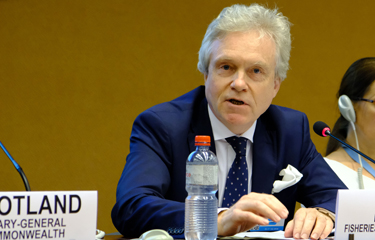New international guidelines are being developed to confront substandard working conditions in the seafood industry by the Food and Agriculture Organization (FAO) of the United Nations.
The FAO is creating the guidelines in response to increased scrutiny on labor violations and human rights abuses in the seafood industry. The guidelines, which were presented at the Conxemar International Congress on Social Sustainability on 30 September, will set an internationally accepted standard for companies and countries seeking to improve practices, clearly articulating core principles of social responsibility
"There is a need to do this because there are a lot of abusive practices that are totally unacceptable," Audun Lem, the deputy director at FAO’s Fisheries and Aquaculture Department, told SeafoodSource.
"The working conditions are not acceptable and they're certainly not in respect of the human rights working conditions by the U.N.," Lem added, listing problems such as slavery, mistreatment of migrant labor, and examples of abysmal conditions in processing plants. "There are too many bad examples all over the world in this fragmented industry."
The guidelines cover all upstream and downstream activities related to fishing and aquaculture, from pre-harvesting to processing and everything in between. Governments will be able to use the guidelines to develop national laws, while ratings and certification organizations will be able to reference them for grading schemes.
Past international standards for the fishing industry have largely revolved around the fish, while agreements addressing workers have floundered or excluded fishermen. The International Labor Organization’s Work in Fishing Convention, which was first adopted in 2007, has only been ratified by just over a dozen countries, and the Maritime Labor Convention covers workers in other seafaring industries but not fishermen.
The new guidelines for fisheries seek to fill that gap. The FAO has experience in drafting standards for working conditions, having already drafted a similar guidelines for the agriculture sector.
"If you're a company and want to demonstrate that your products are socially responsible, this is a guide you can go back to," Katrina Nakamura, a fisheries consultant who co-wrote the initial draft of the guidelines, told SeafoodSource. "It's more a matter of pulling attention to the things we haven't been thinking about because we've been thinking about fish ... It's guidance. It's meant to be helpful to people. It's not meant to be punitive."
FAO member states mandated development of the guidelines, which were created after multiple years of consultations. Every year since 2014, FAO has hosted dialogues on the benefits of promoting decent employment in fisheries and aquaculture, with the Committee on Fisheries (COFI) formally adding social responsibility to the agenda for the first time in 2017, at a meeting in Busan, South Korea. In 2018, the FAO formally recommended the guidelines be developed. In 2019, FAO held a series of dialogues during sessions in Agadir, Brussels, Rome and Shanghai, along with an online public consultation that received 750 comments, Lem said.
Now, FAO will take the draft guidelines to member countries, starting during the COFI meeting in Vigo, Spain in November. The document must go through a negotiation process, and then will emerge as an approved document as soon as 2020.
The guidelines aim to strike a balance between laying out firm stances on hot-button issues such as human rights and seafood slavery while not alienating member countries cooperating with the process.
"We don't want to be over-ambitious, because if we're over-ambitious and include everything and be overly prescriptive and demanding, there will be push-back and the process will stop," Lem said. "Maybe some NGOs would have liked for us to be more aggressive and strict, but we still have to get everyone on board ... We need all the stakeholders and all the countries involved."
The guidelines include specific principles on key topics. They call for the elimination of all forms of harassment, slavery, and forced or compulsory labor, while advocating for the acceleration of gender equity and specific measures empower women, including through leadership assignment. Small-scale fishermen and migrant workers are noted to have the same human rights as others, including decent working conditions, access to information, and labor protection, while migrant workers should have the necessary support from either their home or host country.
A second part of the guidelines, consisting of six appendices, will be developed to specifically address small-scale fishing, industrial fishing, aquaculture production, processing, distribution, and retailing. Other appendices may also be created, depending on what countries want to add.
"We work with the globe, everyone, and there are big differences in countries in what consumers think is important and what other countries think is important," Lem said. "The problem is companies supplying the local or regional or national markets in some countries that are sometimes not so alert to the conditions."
Photo courtesy of Wikimedia Commons







